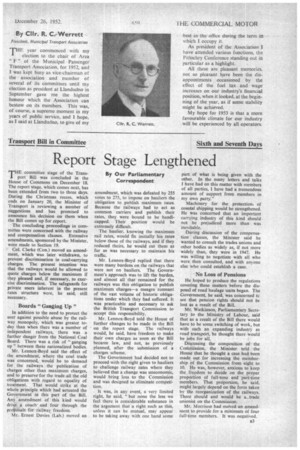Transport Bill in Committee Sixth and Seventh Days
Page 37

If you've noticed an error in this article please click here to report it so we can fix it.
Report Stage Lengthened
By Our Parliamentary Correspondent THE committee stage of the Transport Bill was concluded in the House of Commons on December 18. The report stage, which comes next, has been extended from two to three days. During the Christmas recess, which ends on January 20, the Minister of Transport is reviewing a number of suggestions and has promised to announce his decision on them when the Bill comes up for report.
The concluding proceedings in committee were concerned with the railway and compensation clauses. Extensive amendments, sponsored by the Minister, were made to Section 19.
Col. Clarke (Con.) moved an amendment, which was later withdrawn, to prevent discrimination in coal-carrying charges. The present intention was that the railways would be allowed to quote charges below the maximum if they pleased and, if necessary, to exercise discrimination. The safeguards for private users inherent in the present rates structure were, he said, still necessary.
Boards "Ganging Up"
In addition to the need to protect the user against possible abuse by the railway monopoly, which was greater today than when there was a number of independent railways, there was a further danger from the National Coal Board. There was a risk of "ganging up" between these nationalized bodies.
Mr. Lennox-Boyd said the effect of the amendment, where the coal trade was concerned, would be to demand for the railways the publication of charges other than maximum charges, and to preserve for the trade all the old obligations with regard to equality of treatment. That would strike at the whole principle which had actuated the Government in this part of the Bill. Any amendment of this kind would drive a coach and font through the proPtisals for railway freedom.
Mr. Ernest Davies (Lab.) moved an amendment, which was defeated by 255 votes to 275, to impose on hauliers the obligation to publish maximum rates. Because the railways had to act as common carriers and publish their rates, they were bound to be handicapped. Their position would be extremely difficult.
The haulier, knowing the maximum rail rates, would fix initially his rates below those of the railways, and if they reduced theirs, he would cut them as far as was necessary to maintain his traffic.
Mr. Lennox-Boyd replied that there were many burdens on the railways that were not on hauliers. The Government's approach was to lift the burden, and almost all that remained for the railways was this obligation to publish maximum charges—a meagre remnant of the vast volume of -historic obligations under which they had suffered. It was practicable and necessary to ask the British Transport Commission to accept this responsibility.
Mr. Lennox-Boyd told the House of further changes to be made in the Bill on the report stage. The railways would, he said, have freedom to make their own charges as soon as the Bill became law, and not, as previously planned, after the submission of a charges scheme.
The Government had decided not to proceed with the right given to hauliers to challenge railway rates where they believed that a change was uneconomic, would bring loss to the Commission and was designed to eliminate competition.
It was, in any event, a very limited right, he said, " but none the less we feel there is considerable substance in the argument that a right such as this, unless it can be mutual, may appear to be taking away with one hand some part of what is being given with the other. In the many letters and talks I have had on this matter with members of all parties, I have had a tremendous amount of support from members in my own party."
Machinery for the protection, of coastal shipping would be strengthened. He was concerned that an important carrying industry of this kind should not be prejudiced more than was inevitable..
During discussion of the compensation clauses, the Minister said he wanted to consult the trades unions and other bodies as widely as, if not more widely than, they were in 1947. He was willing to negotiate with all who were then consulted, and with anyone else who could establish a case.
No Loss of Pensions
He hoped to produce the regulations covering these matters before the disposal of road haulage units began. The Government, he said, was concerned tc see that pension rights should not be lost as a result of the Bill.
Mr. Watkinson, Parliamentary Secretary to the Ministry of Labour, said that as a result of the Bill there would have to be some switching of work, but with such an expanding industry as road transport, he thought there would be jobs for all.
Discussing the composition of the Commission, the Minister told the House that he thought a case had been made out for increasing the membership of the Commission from eight to 10. He was, however, anxious to keep the freedom to decide on the proper proportion of full-time and part-time members. That proportion, he said, might largely depend on the form taken by the reorganization of the railways. There should and would be a_trade unionist on the Commission.
Mr. Morrison had moved an amendment to provide for a minimum of four full-time members. It was negatived,












































































